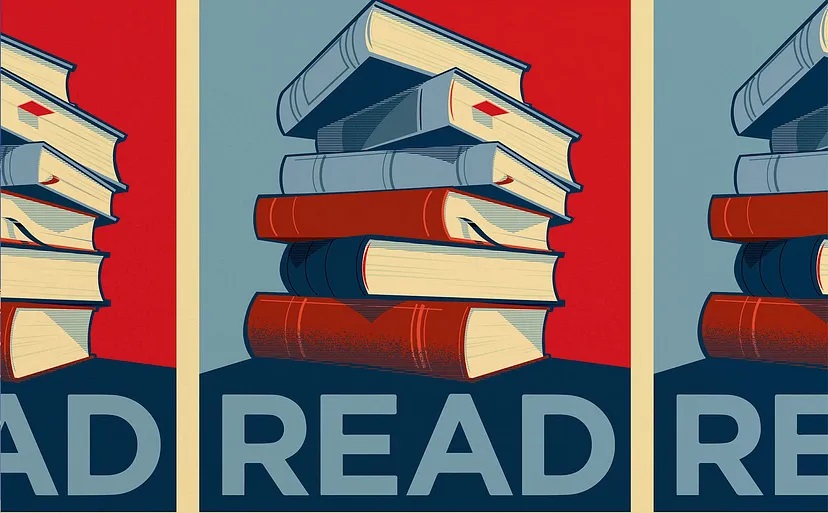This post was written by NCTE member Cody Miller.
On July 17th of this year, President Obama tweeted out a statement in which he effusively praised librarians across the country while unwaveringly condemning the various efforts to ban books happening in state houses. His accolades for librarians echoed my own feelings about the work librarians do (work that is frequently underfunded and increasingly under attack). Yet, his musings on the current wave of book bans included language that I found troublesome:
“It’s no coincidence that these ‘banned books’ are often written by or feature people of color, indigenous people, and members of the LGBTQ+ community – though there have also been unfortunate instances in which books by conservative authors or books containing ‘triggering’ words or scenes have been targets for removal. Either way, the impulse seems to be to silence, rather than engage, rebut, learn from or seek to understand views that don’t fit our own.”
President Obama is correct that books being banned are overwhelmingly authored by LGBTQ and BIPOC writers. However, his latter comment about conservative authors being the target of removal does not describe the differences in how and why LGBTQ and BIPOC author books are being targeted and who is doing the targeting. To illustrate the difference you can easily find several Republican-controlled states passing bills that ban books and conversations about topics relating to LGBTQ and BIPOC authors (despite a bipartisan consensus among voters against book banning efforts, which includes about half of Republican voters). You cannot find an example of a Democratic-controlled state passing a bill that would ban the works of a conservative author or punish educators for not including trigger warnings. The political asymmetry between the examples President Obama offers up cannot be ignored.
The statement also included the former president continuing a frustrating trend of bemoaning college students who fight for better curriculum and learning experiences. The false equivalencies and criticism of college students belies how power is shaping the current wave of book banning efforts. As journalist Cory Collins of Learning for Justice has noted, politicians and media figures can often mask or ignore power imbalances in reporting, which leads to readers lacking a broader picture of the social, political, and cultural factors at play. To return to President Obama’s statement: a group of students asking for a right-wing author’s book to be removed from a collection is not the equivalent to a state legislative body and its allied political party using the full force of the government to remove LGBTQ and BIPOC authors. For one, a group of students do not hold the quantity or quality of political power that state lawmakers hold. Additionally, the removal of LGBTQ and BIPOC writers from public spaces is a modern extension of historical oppression from the state. You and I may personally hold a range of opinions about college students trying to remove a book authored by a writer whose political views we detest from a library. However, from an analysis of power, we can conclude that putting students’ attempt to remove a conservative author from a library is not an equivalent to what is happening in Florida and other states with similar state legislatures.
President Obama’s statement and the profusive responses it garnered online has led me to believe that we must talk about power and policy when discussing book bans. Centering power and policy means factoring in history as well as explicit definitions of policies and legislation. PEN America names policies and government actors in their definition of book bans. Considering how policy and power shape book bans could point to a refined response to the wave of book bans we’ve seen over the past three years. The following questions have helped me better understand and vocalize the stakes of various book banning efforts over the past three years.
Who is doing the banning? How are they achieving the book banning? For instance, is the ban coming from a piece of state legislation or is it coming from one of the 11 people who are responsible for a majority of book ban requests in the country? The answer to this question can help guide action steps. For instance, if a ban is being taken up at a school board meeting, then attending the school board meeting can be one strategy to thwart the ban. However, if the ban is coming from purposefully nebulous legislative text, then identifying where your state representative stands on the bill can become a site for action. There is not a singular way that books are being banned in our current moment, so knowing who is behind the banning and how they’ve trying to enact the ban is important.
How is this book ban part of a larger pattern in public life and American politics? This question helps address the question of power that was missing from President Obama’s statement. Understanding how power shapes an effort to ban a book gives insight into the broader political forces at play. This question can also provide insight into building coalitions for larger public school projects. An episode of the podcast Have You Heard details how student and community activists fighting school privatization movements linked the fight to other efforts to harm public schools, like book banning and anti-LGBTQ policies. Understanding how a particular book banning effort is linked to broader policies can provide a ramp for activists fighting book bans to find valuable allies in widely defending public schools. The Chicago teacher strikes in 2012 have demonstrated the power of this tactic.
What work is already being done to stop the ban? How can I support that work? This question can help connect people to work that is already being done to fight against book bans. Being horrified by what is happening with book bans in the past three years is understandable. And, it’s important to note that there are activists who have been developing strategies and moves to fight for the freedom to read. Knowing activists and organizations who have history fighting book bans can provide insight into strategies and methods to employ depending on the context. These activists and organizations also typically know who are allied players and which political actors need pressure and persuasion. Knowing who has a history fighting book bans can also make challenging book bans a solidarity-building experience.
At the end of his letter, President Obama invited readers to democratic participation by reviewing the organization Unite Against Book Bans. The organization includes suggestions and tips to fight against the wave of book bans. Their material on attending a school board or town hall meeting is especially valuable. It’s encouraging to see the former and current president using their platform to speak out against the dangers of book banning and the ensuing harm these bans do to young people. We must continue speaking out against these bans and demand sympathetic political and civic leaders do the same. At the same time, we must be clear that our conversations about books don’t rely on both sides-ism tropes that bely the broader goals of these book banning political actors. The politicians voting to ban books and honest history are the same politicians seeking to make trans healthcare illegal, enact voter suppression laws, defund public schools and libraries, and curtail social and civil progress of the last seven decades. A group of college students questioning the place of one book in a library or calling for stronger trigger warnings do not pose a similar threat to pluralistic democracy. Addressing power and policy in our conversations about book bans will make that distinction clear.

Cody Miller is an associate professor of English education at SUNY Brockport. During his seven years as a high school English teacher and in his current role, he has positioned texts as vehicles to discuss broader sociopolitical issues in students’ lives and worlds. Miller is the editor of English Leadership Quarterly. He was awarded NCTE’s LGBTQIA+ Advocacy & Leadership Award in 2022. He can be reached at hmiller@brockport.edu or on Twitter at @CodyMillerELA.
It is the policy of NCTE in all publications, including the Literacy & NCTE blog, to provide a forum for the open discussion of ideas concerning the content and the teaching of English and the language arts. Publicity accorded to any particular point of view does not imply endorsement by the Executive Committee, the Board of Directors, the staff, or the membership at large, except in announcements of policy, where such endorsement is clearly specified.

